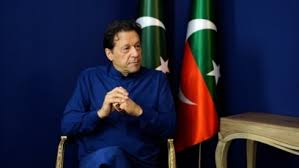The ongoing detention of Imran Khan, Pakistan’s former prime minister, has taken a troubling turn as reports emerge of his severe isolation and deteriorating conditions. Imran Khan, once a celebrated cricket star turned political leader, now finds himself at the center of a human rights controversy that has caught international attention. His ex-wife, Jemima Khan Goldsmith, has brought these concerns to light, highlighting the urgent need for intervention and transparency in his treatment.
Alarming Prison Conditions and Isolation
The reports of Imran Khan’s prison conditions paint a grim picture:
1. Complete isolation since September 10, with no contact with the outside world.
2. Confinement in a dark cell with electricity and lights turned off.
3. Denial of visits from family members and legal representatives.
4. Concerns about his safety, well-being, and deteriorating health.
These conditions raise serious questions about the adherence to international standards for the treatment of prisoners and the potential violation of basic human rights.
Political Implications and Family Concerns
The situation surrounding Imran Khan’s detention is complex, with various factors at play:
1. Claims by supporters that the charges against him are politically motivated.
2. Concerns expressed by the Pakistan Tehreek-e-Insaf (PTI) party about Khan’s health and safety.
3. The impact on Khan’s family, particularly his sons who are unable to communicate with their father.
4. Broader implications for political freedoms and human rights in Pakistan.
The case has become a focal point for discussions about political persecution and the state of democracy in the country.
International Appeals and Personal Harassment
Efforts to address Khan’s situation have extended beyond Pakistan’s borders:
1. Jemima Khan Goldsmith’s appeal to UK Foreign Secretary David Lammy for assistance.
2. Calls for international intervention and adherence to human rights standards.
3. Reports of harassment and threats faced by Goldsmith for speaking out.
4. Requests for the release of Khan’s detained relatives, including his nephew and sisters.
These developments highlight the international dimensions of the case and the personal risks faced by those advocating for Khan’s rights.
The situation surrounding Imran Khan’s detention raises critical questions about the treatment of political figures and the state of human rights in Pakistan. As a former prime minister and leader of a major political party, Khan’s case has significant implications for the country’s political landscape and its international reputation.
The reported conditions of Khan’s imprisonment, if accurate, appear to violate basic standards of humane treatment. The denial of family visits, legal counsel, and basic amenities like lighting are particularly concerning. Such treatment not only raises human rights issues but also questions about the motivations behind these actions.
Jemima Khan Goldsmith’s public statements bring an additional dimension to the case. As Khan’s ex-wife and the mother of his children, her concerns highlight the personal and familial impact of his detention. Her appeals to international figures like the UK Foreign Secretary underscore the perceived need for external intervention in what is ostensibly a domestic legal matter.
The harassment and threats reported by Goldsmith also point to a broader issue of political intimidation and the risks faced by those who speak out against powerful interests. This aspect of the case raises concerns about freedom of expression and the safety of political dissent in Pakistan.
The involvement of international figures and media in this case reflects its significance beyond Pakistan’s borders. It touches on issues of global concern, including the treatment of political opposition, the independence of the judiciary, and the role of international diplomacy in addressing human rights concerns.
The case also highlights the complex relationships between politics, law, and human rights in developing democracies. The treatment of high-profile political figures like Khan can serve as a barometer for the overall health of a country’s democratic institutions and its commitment to the rule of law.
As the situation continues to unfold, it will be crucial to monitor any developments in Khan’s case, including potential responses from the Pakistani government to these allegations. The international community’s reaction and any diplomatic efforts to address the situation will also be significant factors to watch.
The case of Imran Khan serves as a reminder of the ongoing challenges faced by many countries in balancing political stability, legal processes, and human rights. It underscores the importance of transparency, due process, and adherence to international standards in the treatment of all individuals, regardless of their political status or influence.
The isolation of Imran Khan in a dark cell, prevented from contacting his sons, represents a troubling development in his ongoing detention. As concerns mount over his well-being and the potential violation of his rights, the case has become a flashpoint for broader discussions about political freedoms and human rights in Pakistan. The international community’s response to these allegations and the Pakistani government’s handling of the situation will be critical in determining the outcome of this high-profile case and its implications for the country’s democratic future.
Related News
















